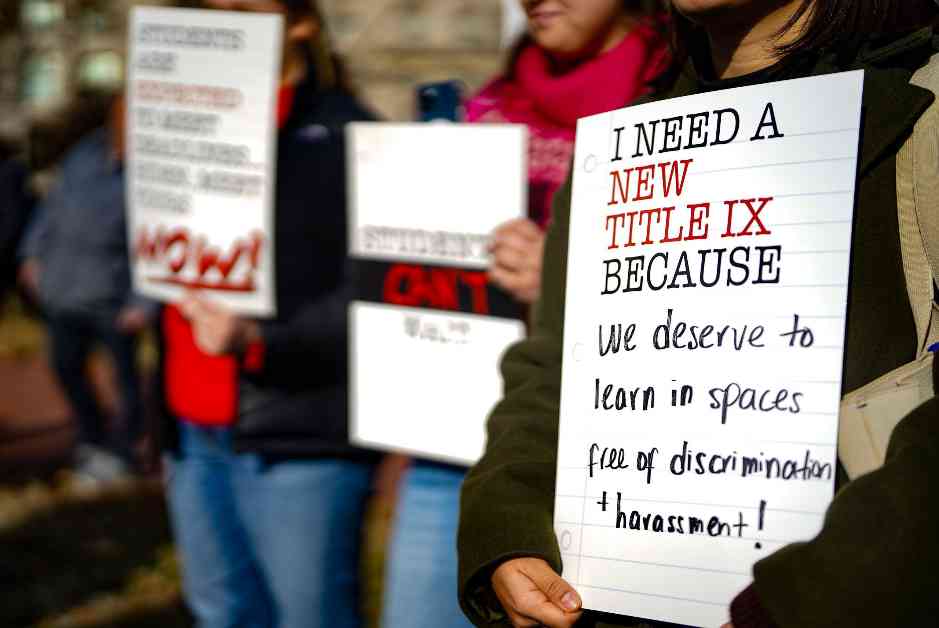The Biden administration’s Title IX Discrimination Rules: A Deep Dive into the Current Status and Latest Updates
The Biden administration’s Title IX rules on sex discrimination have been met with legal challenges, leading to a complex legal landscape across the country. Judges in 26 states have blocked the implementation of the new rule, creating confusion for school officials who are trying to navigate their obligations under the law. In addition, schools and universities attended by children of members of Moms for Liberty, Young America’s Foundation, and Female Athletes United have also halted the implementation of the new rule following lawsuits from these groups.
This legal battle has resulted in K-12 schools and colleges in these states continuing to follow the Title IX rules established during the Trump administration, rather than the newer regulations proposed by the Biden administration. This has left educators, students, and parents uncertain about their rights and responsibilities under Title IX.
The Trump administration’s Title IX rules were controversial for various reasons, including their narrow definition of sex discrimination and their impact on survivors of sexual assault on college campuses. The Biden administration’s proposed changes aimed to address these concerns by expanding the definition of sex discrimination, providing more protections for survivors, and ensuring a fairer process for all parties involved in Title IX investigations.
Despite the legal challenges and the ongoing debates surrounding Title IX, it is essential to remember the core purpose of this law: to ensure that all students have equal access to education free from discrimination based on sex. While the implementation of Title IX rules may vary from one administration to another, the underlying principles of equity and fairness remain unchanged.
Impact on Students and Schools
The legal battles over the Biden administration’s Title IX rules have had a significant impact on students and schools across the country. In states where the new rule has been blocked, educators are left in a difficult position of trying to comply with conflicting regulations. This has created confusion and uncertainty for both students and school officials, who are unsure of their rights and obligations under Title IX.
For survivors of sexual assault and harassment on college campuses, the legal challenges to the Biden administration’s rules have raised concerns about the protections available to them under Title IX. The Trump administration’s rules were criticized for providing less support and resources to survivors, and many fear that reverting back to these rules could further harm students who have experienced sexual violence.
In K-12 schools, the legal uncertainty surrounding Title IX has also had an impact on students, particularly those who are members of marginalized communities. Title IX is a critical tool for addressing issues of sex discrimination in schools, including harassment, unequal treatment, and barriers to educational opportunities. Without clear guidance on how to enforce Title IX rules, schools may struggle to protect the rights of all students.
Challenges and Opportunities
The legal challenges to the Biden administration’s Title IX rules present both challenges and opportunities for advocates of gender equity and survivors of sexual violence. While the blocking of the new rule in several states is a setback for those seeking stronger protections under Title IX, it also highlights the need for continued advocacy and support for survivors.
One of the key challenges facing advocates is the lack of consistency in how Title IX is enforced across different states and institutions. Without clear guidelines and regulations, students and educators may face barriers to reporting incidents of sex discrimination and accessing the resources they need to address these issues effectively.
However, this legal battle also presents an opportunity for advocates to push for stronger protections under Title IX and to ensure that all students have access to a safe and inclusive educational environment. By engaging in ongoing dialogue with policymakers, educators, and community members, advocates can work towards a more equitable and just implementation of Title IX rules.
Looking Ahead
As the legal challenges to the Biden administration’s Title IX rules continue to unfold, it is essential for all stakeholders to stay informed and engaged in the conversation. From educators to students to parents, everyone has a role to play in upholding the principles of equity and fairness enshrined in Title IX.
While the current status of Title IX may be uncertain in some states, the core values of this law remain steadfast. By working together to advocate for stronger protections, support survivors, and promote gender equity in education, we can ensure that all students have the opportunity to learn and thrive in a safe and inclusive environment.
In conclusion, the legal battles over the Biden administration’s Title IX rules highlight the ongoing challenges and opportunities in ensuring gender equity and protecting the rights of all students. By staying informed, engaged, and committed to the principles of Title IX, we can work towards a more just and equitable educational system for everyone.

